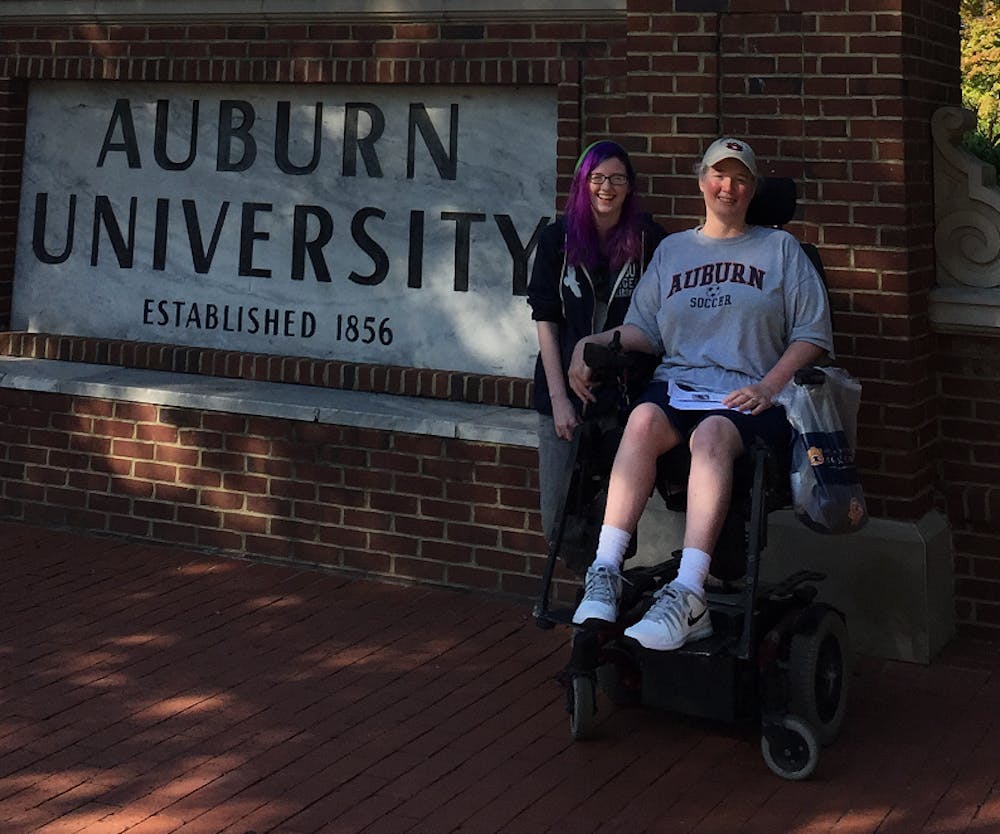Sloan Kiechel, computer science major at Auburn, remembers looking through her mother's family photo albums in Charlotte, North Carolina. She always knew about the 20 albums that lined the walls of her living room, but Sloan Kiechel had always assumed they were of herself as a kid and her two older brothers.
Looking at the first 10 albums, though, Sloan Kiechel saw her mother in way that she had never seen her before.
She saw her mom in high school when she played soccer, basketball and softball; when she ran her own suicide prevention program because she had already lost two friends to suicide. In those albums, Sloan Kiechel saw her mom untouched by a vicious disease.
When Sloan Kiechel, a computer science major, was 3 years old, her mom, Susan Kiechel, was diagnosed with Chronic Inflammatory Demyelinating Polyneuropathy.
This is a genetic, autoimmune disease similar to MS, which can be debilitating but is only life-threatening in 5 to 10 percent of patients.
Susan Kiechel is in that 5 to 10 percent. Her disease is life threatening.
After graduating high school in 1988, Kiechel “fell in love” with Auburn. Being from North Carolina, she didn’t have any familial connections here on the Plains, but after one visit, she had made up her mind.
While studying secondary English here at Auburn she continued to run her suicide prevention program, worked as an RA in Helen Keller Hall and played club soccer as the University did not have a varsity team then.
That soccer team and the University’s refusal to adequately fund it became a defining part of Kiechel’s time here.
For years Kiechel’s club team played and occasionally beat other college teams in “scrimmages.” They practiced and played on the field across from the TKE house.
The field was only three-fourths regulation size and in such bad condition that the team was forced to rent a different field in town for games because college-funded teams refused to play there.
Kiechel’s senior year she stepped in a hole at practice and broke her ankle.
After that, she approached the Athletics Department with two requests for the future women’s soccer teams:
1) Fix the current field or build a new one, and
2) Fund the team adequately.
Pat Dye was both the athletic director and head football coach at the time, and there were not any women in administrative roles in the Athletics Department.
This was the climate Kiechel waded into to demand justice.
According to Kiechel, women’s sports at that time received roughly 12 percent of the Athletics Department’s budget, a clear Title IX violation.
Kiechel remembers Joe Dean, an administrator in the Athletics Department, telling her that “Title IX has been on the books for 20 years, if you want us to do something about it, you’re going to have to sue us.”
Eventually, she did.
First, Kiechel continued to try to solve the problems through official channels on campus. She filed a Title IX complaint, started a petition which garnered over 1,300 signatures from women on campus and recorded women on campus expressing their support for a women’s soccer team.
Kiechel waited five hours to show this recording to the Athletics Director who promptly “snuck out the back door.”
Seeing no change on the horizon, Kiechel and her supporters sued.
Kiechel remembers being told that she would never win this case. She also remembers that “they were shocked at how stubborn [she] was.”
Kiechel won the case, but then the University announced that they would appeal the decision.
“We didn’t want to spend years in appeal,” Kiechel said, “So I chose to settle in May with the stipulation that they had to fund a full team that August.”
They also forced the Athletics Department to offer the full number of NCAA scholarships for women’s soccer every year.
The settlement also forbade Auburn from defunding other women’s sports like softball or basketball to pay for these additions.
The national attention Kiechel’s case drew led her to testify in front of the U.S. Congress in June of 1993, and she also gave presentations at Duke Law School and women’s athletic events.
“It was not a battle I wanted,” Kiechel said, “but it was one I had.”
Since the lawsuit was settled some 20 years ago, Kiechel and Auburn have made amends.
Three years ago, Auburn’s SGA gave Kiechel an accommodation, which means they recognized that she met the standards of the Auburn Creed when she took these actions.
Then, in December of 2000, as an activist, an athlete and a mother of three, Susan Kiechel was 30-years-old and was diagnosed with severe CIDP. She was given three years to live.
But Susan Kiechel has never taken that kind of answer as fact.
“I’ve got three kids, and I’m a mom, and you’re not going to tell me what I can’t do,” Kiechel said.
Over the next four months, Kiechel went from chasing kids in her backyard to using leg braces, fore-arm crutches and a four-wheeled walker.
“A lot of stuff changed very quickly,” Kiechel said, “but I had to fight because I had to raise my kids.”
Her long-term goal was to live until Sloan, her youngest daughter, turned ten so that she would remember her mom.
Kiechel began receiving monthly treatments of IVIG which required her to be in the hospital for five days every month and made her sick for another three.
This kind of treatment saved her life but threatened to kill her at the same time. Too large or too small of a dose would be fatal.
That was this family of five’s normal for 17 years.
“Every few years there would be some kind of crisis where Mom got extra sick and we thought she was going to die,” Sloan said, “but we always made it through.”
Susan Kiechel remembers each of her kids recognizing the pain she was in and separately telling her that she didn’t have to suffer for them anymore.
“Obviously they didn’t want me to die, but they were old enough to recognize that I had done it all these years for them,” Kiechel said, “but that’s what I’m supposed to do, I’m a mom, I don’t get a gold star.”
But Susan Kiechel continued to live. She watched her daughter turn ten and she watched all of her children graduate high school.
Kiechel has now gotten to the point where she spends most of her time in the hospital. Last year she spent 208 days there and is often at home for fewer than ten days at a time.
The IVIG treatment which she receives now gives her aseptic meningitis every month.
“Normally you would just stop whatever is causing that, but this is what keeps me alive,” Kiechel said.
For the past two years though, the Kiechel family has had a different reason to keep fighting.
Stem cell treatments (SCT) could potentially cure Kiechel. She wouldn’t need monthly hospital visits; she wouldn’t live under the threat of an infection ending her life.
“The last two years my fight has been to stay alive long enough to receive SCT which will solve the problem permanently,” Kiechel said.
In July of 2018, Kiechel was approved to receive this treatment, but complications with insurance have prevented her from being able to get it.
Instead, the hospital is requiring her family to pay $160,000 upfront to cover the cost of the treatment.
This family has strength, support and love, but not $160,000.
Ever the activist and fighter, Susan Kiechel said, “If I had three more months to make a formal fight with United Healthcare, I would probably win that fight. But my body doesn’t have three more months of IVIG.”
“I just want to scream,” Susan said, “damnit, I’m going to die when I’m this close, and it’s because of money.”
Once the family realized that the insurance would not pay for this treatment, they turned to GoFundMe.
As of the publication of this article, $27,952 has been raised, but there is a long way to go.
The family is hoping to raise $140,000. They have reached out to the Auburn Family for help. Her GoFundMe can be found here:
https://www.gofundme.com/life-saving-treatment-for-susan
Do you like this story? The Plainsman doesn't accept money from tuition or student fees, and we don't charge a subscription fee. But you can donate to support The Plainsman.





